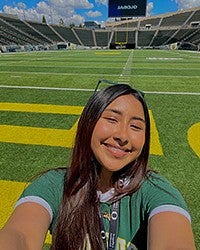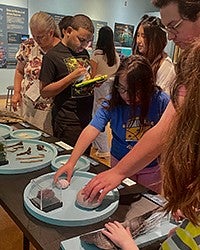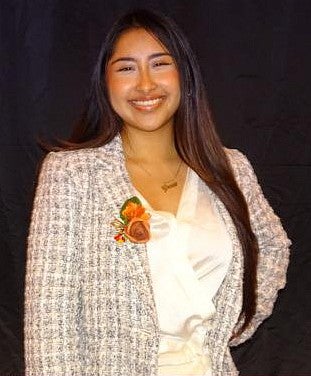
Learn more about Grecia Acevedo, a student graduating from the Communication Disorders and Sciences (CDS) program, through our Graduate Spotlight series.
"Find a community that supports you, whether that’s classmates, faculty, or mentors, because having people who uplift you makes all the difference."– Grecia Acevedo
Grecia (she/her/ella), from Santa Ana, California, is a first-generation Mexican-American student who is graduating with a master's degree in Communication Disorders and Sciences (CDS).
Grecia is passionate about advocacy, awareness, diversity, equity, and inclusion initiatives within the field of speech-language pathology. Supported by her advisor Stephanie De Anda, her research thesis explores how parent beliefs about communication concerns impact bilingual language development in Latino/x/e children from Spanish-English households, with a focus on promoting culturally responsive practices for speech-language pathologists. After graduation, Grecia plans to complete her Clinical Fellowship Year (CFY) and obtain her professional certification and licensure as a Speech-Language Pathologist in California. Her goal is to gain experience across various settings (public schools, private practice, hospitals, clinics, and home health) with hopes to deepen her understanding of healthcare access.
Reflecting on her time at UO, she is grateful for the meaningful friendships that gave her a sense of belonging and balance that allowed her to fully experience everything Oregon has to offer.
What inspired you to serve as a cohort representative?
I was inspired by my passion for advocacy, leadership, and mentorship. As a first-generation student, I understand the importance of creating supportive spaces where peers feel heard and valued. I took on this role to advocate for my cohort’s needs, foster a sense of community, and help navigate challenges that arise in our rigorous program.
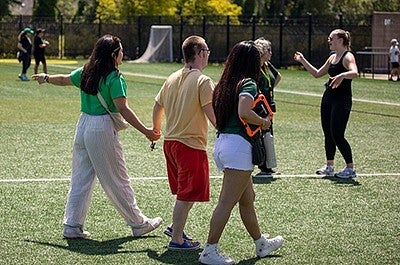
What is the focus of your master’s thesis research?
With the support of my advisor, Dr. Stephanie De Anda, my thesis research focuses on bilingualism and language development in Latino/x/e children growing up in Spanish-English households. Specifically, I examine how parent beliefs about their child’s communication concerns may influence their child’s bilingual language outcomes and explore clinical implications for speech-language pathologists working with this population. Through this work, I aim to contribute to a growing body of research that promotes culturally responsive and linguistically appropriate assessment and intervention practices in the field.
What are your plans following graduation?
After graduation, I plan to complete my Clinical Fellowship Year (CFY) to obtain my professional certification and licensure as a Speech-Language Pathologist in California. My goal is to gain experience across various settings (public schools, private practice, hospitals, clinics, and home health) to deepen my understanding of healthcare access. In the long term, I aspire to pursue a doctorate abroad to explore global perspectives on advocacy, healthcare, equity models, and policy practices, ultimately contributing to initiatives that advance speech-language pathology.
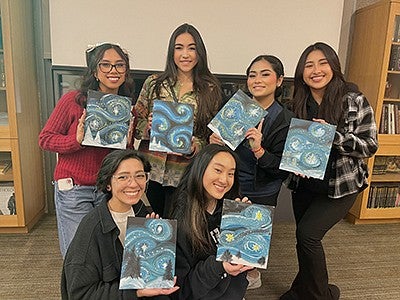
What advice would you give to incoming/current students?
Graduate school is a demanding yet rewarding experience, and my biggest piece of advice is to prioritize balance and self-advocacy. Find a community that supports you, whether that’s classmates, faculty, or mentors, because having people who uplift you makes all the difference. Be intentional about seeking opportunities that align with your passions but also recognize that rest is just as important as productivity. There will be challenges, but staying connected to your “why” (the reason you chose this field) will help you push through. Lastly, don’t be afraid to use your voice. Whether advocating for yourself, your clients, or systemic change, your perspective and lived experiences bring invaluable insight to the field.
What made your experience at UO special?
Beyond academics and clinical training, what truly made my time at UO special were the meaningful friendships I built. These friendships gave me a sense of belonging and balance that allowed me to fully experience everything Oregon has to offer. From cheering at football games, hiking through breathtaking scenery, attending concerts, and taking spontaneous trips to the coast and lakes, to simply traveling and spending quality time with friends, I was able to step away from the demands of academia and create unforgettable memories. These moments not only helped me recharge but also reminded me of the importance of community, joy, and having a well-rounded graduate school experience.
